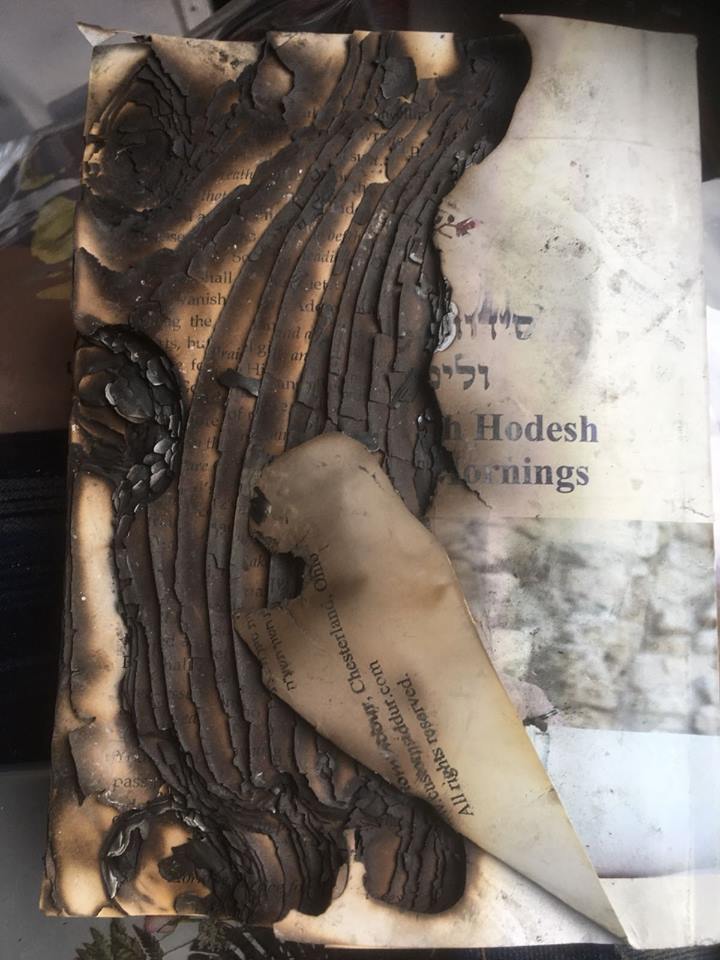| Translation (Hebrew) | Source (English) |
|---|---|
אֲבוֹתֵֽינוּ נָתְנוּ גֹֽדֶל לָאֵל. אֶת־מַעֲשֵׂי יָדָיו בִּשְׁמֵי הָרָז מִמַּֽעַל סִפֵּֽרוּ. בַּחֲלִיפוֹת הַמַּרְאוֹת בָּאָֽרֶץ מִתָּֽחַת. |
Our fathers acclaimed the el[1] deity. Whose handiwork they read In the mysterious heavens above And in the varied scene of earth below, |
וּבְסֵֽדֶר הַמַּחֲזוֹר לַיָּמִים וְלַלֵּילוֹת. לַתְּקוּפוֹת וְלַשָּׁנִים. וּבְתַשְׁבֵּץ גּוֹרַל הָאָדָם׃ |
In the orderly march of days and nights, Of seasons and years, And in the checkered fate of man. |
וְהִנֵּה מוֹג הִתְמוֹגְגָה קִמֹּֽרֶת הַשַּֽׁחַר. לַֽיִל יְגַלֶּה נִבְכֵי חָלָל אֵין־מְצָרִים יְכַסְיֵֽמוֹ אוֹר הַיּוֹם. לַֽיִל יְגוֹלֵל שְׂדוֹת־רְאִיָּה נֶֽעֶדְרֵי־אֹֽפֶק. מֶרְחַקִּים לֹא שֵׁעֲרָם הַדִּמְיוֹן׃ |
Meantime have the vaulting skies dissolved; Night reveals the limitless caverns of space, Hidden by the light of day, And unfolds horizonless vistas Far beyond imagination’s ken. |
נִדְהֲמָה דַֽעַת אֱנוֹשׁ. אַךְ מְהֵרָה קוֹם תָּקוּם. וּבַהֲצִיצָהּ דֶּֽרֶךְ אֹֽפֶל לֹא־תְחוּמִים. שׁוּב עַל־מְכוֹנָהּ תִּכּוֹן. לְאוֹר שְׁמָשׁוֹת רְחוֹקוֹת. כֻּוְּצוּ עַד־הָפְכָּם נִצּוֹצוֹת בּוֹעֲרִים׃ |
The mind is staggered, Yet soon regains its poise, And peering through the boundless dark, Orients itself anew By the light of distant suns Shrunk to glittering sparks. |
עוֹטְפָה הַנְּשָׁמָה. אַךְ מְהֵרָה תָּשׁוּב תֶּֽחִי. שֵׁנִית תִּלְמַד לִקְרֹא שֵׁם אֱלֹהִים עַל־פְּנֵי רָקִיעַ. תְּכָנַֽתּוּ בְחָזוּת חֲדָשָׁה׃ |
The soul is faint, Yet soon revives, And learns to spell once more the name Elohim Across the newly visioned firmament. |
שְׂאוּ־מָרוֹם עֵינֵיכֶם וּרְאוּ מִי־בָרָא אֵֽלֶּה. הַמּוֹצִיא בְּמִסְפָּר צְבָאָם לְכֻלָּם בְּשֵׁם יִקְרָא׃ (ישעיה מ:כו) |
Lift your eyes, look up; Who made these stars? The One who marshals them in order, Summoning each one by name.[2] Isaiah 40:26. |
אֱלֹהִים הוּא הָאַחְדּוּת הַמְגַשֶּֽׁרֶת עִמְקֵי חָלָל אֵין־חֵֽקֶר וּזְמַנֵי עוֹלָמִים אֵין־מִדָּה. הַמְקַשֶּֽׁרֶת אוֹתָם יַחְדָּו בְּמַעֲשֶׂה כְּמוֹ נַעֲשֶׂה אֲנַֽחְנוּ בְּמַחֲשָׁבָה׃ |
Elohim is the oneness That spans the fathomless deeps of space And the measureless eons of time, Binding them together in act, As we do in thought. |
אֱלֹהִים הוּא הַזֶּהוּת בַּחֹֽמֶר הַיְסוֹדִי אֲשֶׁר לְכוֹכְבֵי לֶכֶֽת וּלְכוֹכְבֵי שָֽׁבֶת. לְזֶה מְעוֹנֵֽנוּ הָאָֽרֶץ. וּלְכׇל־נֶֽפֶשׁ חַיָּה הַשּׁוֹכֶֽנֶת בָּהּ׃ |
Elohim is the sameness In the elemental substance of stars and planets, Of this our earthly abode And of all that it holds. |
אֱלֹהִים הוּא הָאִחוּד לְכׇל־הֹוֶה. הַתְמָדַת הַתְּנוּעָה לְכׇל־אֲשֶׁר יָנֽוּעַ׃ הַקֶּֽצֶב אֲשֶׁר לְדָבָר וְדָבָר. וְטִיב פְּעֻלָתָם הַהֲדָדִית׃ |
Elohim is the unity Of all that is, The uniformity of all that moves, The rhythm of all things And the nature of their interaction. |
הַמְקַשֵּׁר מַעֲדַנּוֹת כִּימָה מוֹשְׁכוֹת כְּסִיל יְפַתֵּֽחַ. מוֹצִיא מַזָּרוֹת בְּעִתּוֹ וְעַֽיִשׁ עַל־בָּנֶֽיהָ יַנְחֵם: (על פי איוב לח:לא-לב) |
[Elohim] binds up the Pleiades in a cluster And loosens the chains of Orion; He directs the signs of the Zodiac And guides the constellations of the Bear.[3] Based on Job 38:31-32. |
אֱלֹהִים הוּא סוֹד־הַחַיִּים. הַמַּצִּית אֶת־הַחֹֽמֶר הַדָּמוּם. לִדְחִיפָה פְנִימִית וּלְמַטָּרָה׃ |
Elohim is the mystery of life, Enkindling inert matter With inner drive and purpose. |
הוּא הַשַּׁלְהֶֽבֶת הַיּוֹצֶֽרֶת. הַמְשַׁנָּה חֽוֹתַם־חֹֽמֶר לֹא־יִחְיֶה. עֲדֵי יִקְפֹּץ אֶל מֶמְשְׁלוֹת הֲוָיָה רָמוֹת מִן הָרָם. יֵאוֹר בְּזֹֽהַר לַֽהַט מֵרֶֽגֶשׁ. וּבְאַחֲרִיתוֹ יֵהָפֵךְ לְלַֽבַּת־אֵשׁ מַחֲשָׁבָה׃ |
[Elohim] is the creative flame That transfigures lifeless substance, Leaping into ever higher realms of being, Brightening into the radiant glow of feeling, Till it turn into the white fire of thought. |
וְאַף כִּי אֵין רֶֽמֶז לִיצוּר חַי מַפְרִיעַ אֶת־דִּמְמַת הַנְּצָחִים אֲשֶׁר לַסְּפִירוֹת. לֹא נוֹאִיל לְדַמּוֹת כִּי זֹאת הָאָֽרֶץ. זֹאת הַנְּקוּדָה הַזְּעִירָה בָאֵין־סוֹף. רַק הִיא לְבַדָּהּ חֲנוּנָה דַּֽעַת אֱלֹהִים׃ |
And though no sign of living thing Break the eternal silence of the spheres, We cannot deem this earth, This tiny speck in the infinitude, Alone instinct with Elohim. |
אָכֵן הַמּוֹפֵת הַהוּא הַמְקַשֵּׁר אֶת־הָעוֹלָמוֹת בְּמוֹסְדוֹת חֹֽמֶר. הוּא מְקַשֵּׁר אֶת־כׇּל־הָעוֹלָמוֹת יַחְדָּיו בְּמוֹסְרוֹת חַיִּים: |
By that token Which unites the worlds in bonds of matter Are all the worlds bound In the bond of Life. |
כִּי הִנֵּה יוֹצֵר הָרִים וּבֹרֵא רוּחַ וּמַגִּיד לְאָדָם מַה־שֵּׂחוֹ עֹשֵׂה שַׁחַר עֵיפָה וְדֹרֵךְ עַל־בָּמֳתֵי אָרֶץ יְיָ אֱלֹהֵי־צְבָאוֹת שְׁמוֹ׃ (עמוס ד:יג) |
It is [Elohim] who forms the mountains And creates the wind, And reveals his inner mind to man; The One who makes the dawn and darkness, Who marches over the heights of earth; YHVH Elohei Tseva’ot is Their name.[4] Amos 4:13. |
“God the Life of Nature” by Rabbi Mordecai Kaplan can be found in his Sabbath Prayer Book (Jewish Reconstructionist Foundation 1945), p. 382-391, where it appears side-by-side with its translation into Hebrew by Abraham Regelson. Dr. Mel Scult notes[5] Chapter 7 of The Radical American Judaism of Mordecai M Kaplann, page 150, note 40. that the poem was first published in The Reconstructionist in January 1936, vol 1 no 18, pp. 11-13 and entitled “Revelation of God in Nature: A Piyyut for the First Benediction of the Evening Prayer.”
I have hebraicized Kaplan’s use of ‘God,’ bringing his invocation of the divine name Elohim in sync with that provided in Regelson’s Hebrew translation. This seems to me significant given the relationship long expounded upon between the divine name Elohim and the medieval Hebrew name for Nature, הטבע ha-teva. I have also replaced gender-masucline pronouns with gender-neutral language. Finally, I have introduced a Hebrew name for this prayer which was not included in the Sabbath Prayer Book. –Aharon N. Varady
Source(s)

Notes

“אלהים חיי הטבע | Elohim the Life of Nature, by Rabbi Mordecai Kaplan (1945)” is shared through the Open Siddur Project with a Creative Commons Attribution-ShareAlike 4.0 International copyleft license.










Leave a Reply